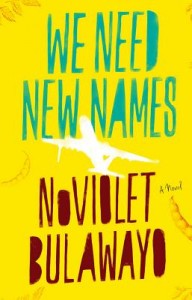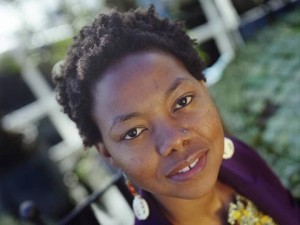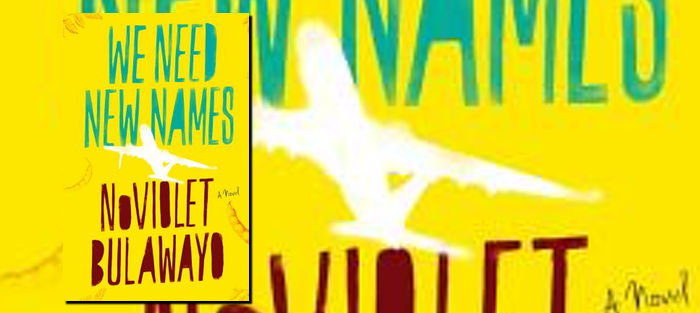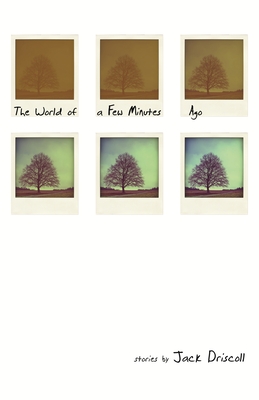Editor’s Note: For the first several months of 2022, we’ll be celebrating some of our favorite work from the last fourteen years in a series of “From the Archives” posts.
In today’s feature, Rebecca Scherm reviews NoViolet Bulawayo’s debut novel, We Need New Names. The review was originally published on June 3, 2013. Bulawayo’s new novel, Glory, published earlier this month, and Scherm’s new novel, A House Between Earth and the Moon, is out today.
 NoViolet Bulawayo’s debut novel, We Need New Names (Little, Brown), opens in Paradise, the Zimbabwe shantytown where Darling and her mother have lived since their house was bulldozed by the government. Starting in 2005, the government program Operation Murambatsvina (“Clear out Rubbish”) destroyed entire neighborhoods in a few hours, leaving more than 300,000 people homeless. But Darling doesn’t know any of this, only that their house is gone. She’s just ten.
NoViolet Bulawayo’s debut novel, We Need New Names (Little, Brown), opens in Paradise, the Zimbabwe shantytown where Darling and her mother have lived since their house was bulldozed by the government. Starting in 2005, the government program Operation Murambatsvina (“Clear out Rubbish”) destroyed entire neighborhoods in a few hours, leaving more than 300,000 people homeless. But Darling doesn’t know any of this, only that their house is gone. She’s just ten.
We Need New Names is Darling’s memoir, fragmented into chapters, many of which can stand alone as stories (and are titled as such). Bulawayo is loyal to her narrator’s perspective, which changes dramatically over the course of the novel as Darling herself grows from an inquisitive child in Zimbabwe into a lonely teenager in Kalamazoo, Michigan. Only three brief chapters are not told from Darling’s point of view, but from somewhere ambiguously above the narrative; these seem intended to remind us that Darling’s circumstances are not exceptional. But Darling, with her shrewd eye for physical detail and her dancer’s ear for the rhythm of language, is as exceptional as her perspective is, and the few chapters that don’t belong to her tend to recede.
In the novel’s first chapter, “Hitting Budapest,” Darling and her friends Godknows, Chipo, and Bastard go to the rich neighborhood (Budapest) to steal guavas from the trees, a little like the way some American children go to the rich neighborhoods for better Halloween candy, except Darling and her friends have not eaten all day, and her stomach feels “like somebody just took a shovel and dug everything out.” Bulawayo’s writing is vivid, clear-eyed, alternately laughing and tight-jawed, but it’s her gift for the precise, evocative interaction that immediately sets this novel apart. In Budapest, the children are spotted by a woman, barefoot and pedicured, snacking on a pastry. “How old are you?” the woman asks Chipo, who is eleven and pregnant, although the girl doesn’t seem to understand how or why.
And how old are you? Godknows asks [the woman in reply]. And where are you from? I’m thinking that Godknows has a big mouth that will get him slapped one day.
Me? Well, I’m thirty three, and I’m from London. This is my first time visiting my dad’s country, she says, and twists the chain on her neck. The golden head on the chain is a map of Africa.
…But you only look fifteen, like a child, Godknows says, looking at the woman now. I am expecting her to reach out and slap him on the mouth but she merely smiles like she has not just been insulted.
Thank you, I just came off the Jesus diet, she says, sounding very pleased.
Then the woman, with “her golden Africa… her smooth skin that doesn’t even have a scar to show she is a living person… her T-shirt that says Save Darfur,” asks if they mind if she takes their picture. It’s a question echoed later, when the NGO workers come to hand out toy guns and Google T-shirts and take endless snapshots of gratefully-smiling African children. The children seem to have a sense that these smiles are how they pay for things.
Upon returning from Budapest, the children find the body of a murdered woman hanging in a tree. At first there is terror, but then Bastard suggests that they steal her shoes to buy a loaf of bread, and at the story’s end, the children are laughing, giddy with the promise of food. Laughter as a response to horror is a frequent motif in the first half of the novel. Darling and her friends face constant, inexplicable violence, but I admire Bulawayo’s loyalty to the limits of their perception. Chipo, for instance, has not spoken in months, and the other children speculate about how she got pregnant—either “Jesus’s mother” put a baby in her or a man did, but they’re not sure and they don’t know how. At first, I read Chipo’s refusal to speak as a kind of shame. Later, the girls witness another sexual assault, this time in church: “He did that, that’s what he did, Chipo says, shaking my arm like she wants to break it off.”
Chipo’s silence is not from the shame of understanding stigma, we learn, but because she lacks the vocabulary to know, let alone articulate, what happened to her. In the title chapter, “We Need New Names,” Chipo is nearly the recipient of a coat-hanger abortion performed by Forgiveness, who has heard it described by an older sister. Darling explains, “Today, we are getting rid of Chipo’s stomach once and for all. One, it makes it hard for us to play, and two, if we let her have the baby, she will just die.” When Forgiveness, straightening the hanger, instructs Chipo to remove her shorts, Chipo panics. She still doesn’t understand the connection, which makes her experience even more painful to read.
 One of the ways Bulawayo navigates the potential pitfalls of the child narrator (obliviousness vs. precocity) is by making not-understanding a dominant theme in the novel. When I compare the not-understanding of Darling and her friends to the not-understanding of my own American childhood, the difference is what we understood from media as opposed to seeing it, or living it, ourselves. Neither Darling nor I received any kind of birds-and-bees talk from our parents, but at ten years old, I had pieced together a strange collection of ideas from television, the magazines at the grocery checkout, and Ann Landers. Darling, on the other hand, witnesses sexual assault, mass political violence, deaths from AIDS, and murder, but always “leaves” the violence, sometimes to play at violence with her friends and their “brand new guns from America.”
One of the ways Bulawayo navigates the potential pitfalls of the child narrator (obliviousness vs. precocity) is by making not-understanding a dominant theme in the novel. When I compare the not-understanding of Darling and her friends to the not-understanding of my own American childhood, the difference is what we understood from media as opposed to seeing it, or living it, ourselves. Neither Darling nor I received any kind of birds-and-bees talk from our parents, but at ten years old, I had pieced together a strange collection of ideas from television, the magazines at the grocery checkout, and Ann Landers. Darling, on the other hand, witnesses sexual assault, mass political violence, deaths from AIDS, and murder, but always “leaves” the violence, sometimes to play at violence with her friends and their “brand new guns from America.”
If American branding, from Converse “All Stars” to the orange Cornell shirt worn by Darling’s friend Bastard, seems relentless amidst this landscape of poverty, why is that? As I read this novel, I thought that Bulawayo’s evocation of American consumerism as a symbol of American freedom and American emptiness occasionally felt too explicit. Then, walking home one afternoon, I passed an American Apparel storefront window where a white plastic mannequin wore a tube skirt in the brand’s persistent “Afrika” print, and I thought, What would Darling and Bastard and Godknows make of this cultural branding? I’m sure Bulawayo has it right: it’s not that she has overwritten American branding, it’s that I am so overexposed to it that I resent having to face it on the page. To Darling, it is all the stuff of fantasy, of laughter, of play: Bin Laden, iPod, What Would Jesus Do?
At times I chaffed at Darling’s abrupt rejections of fear or grief in favor of laughter, which Bulawayo uses several times in the books’ early chapters, when Darling is youngest. But what is Bulawayo saying with this choice? I don’t think that she’s arguing that brutal violence, repeatedly witnessed, becomes regular to the children in the same way we can get desensitized to televised violence: more likely, the children are too young to understand the depth of the brutality, and thank goodness for that. I began to read Darling’s fleeing, both physical and mental, as a gift from Bulawayo, as if to spare her narrator. To stay too long in the heat of fear would be unbearable for Darling, who must bear it, and the reader feels horror implied far beyond what Bulawayo has made explicit. The novel holds tight to its lyrical qualities by turning its cheek to laugh, as Darling does in Paradise.
Halfway through the novel, Darling leaves Zimbabwe and her childhood, and Bulawayo smartly, startlingly mimics the radical changes in Darling’s thinking and in her surroundings in the tone of the prose. In “DestroyedMichygen,” the theme of not-understanding becomes complicated by language, age, and her new culture: Darling is a little older when she arrives in the U.S., that sparkling mirage of plastic electronics and silky underwear, via Detroit. The color seems to leave the language, or at least the landscape:
If you come here where I am standing and look outside the window, you will not see any men seated under a blooming jacaranda playing draughts….you will not see anyone playing country-game or chasing after fire ants. Some things happen only in my country, and this here is not my country; I don’t know whose it is. That fat boy, TK, who is also supposed to be my cousin even though I have never even seen him before, says, This is America, yo, you won’t see none of that African shit up in this motherfucker.
What you will see if you come here where I am standing is the snow. Snow on the leafless trees, snow on the cars, snow on the roads, snow on the yards, snow on the roofs—just snow covering everything like sand. It is as white as clean teeth and it is also very, very cold… coldness that makes like it wants to kill you, like it’s telling you, with its snow, that you should go back to where you came from.
Now the only color is in stuff, like the red push-up bra that her Aunt Fostalina struggles to order, on the phone, from a catalog. In America, Darling finds not luxury but loneliness. We notice when she picks up bits of slang, currency for belonging. She finds uneasy friendship in school with Nigerian Marina and American Kristal, and when Kristal makes fun of Darling’s accent, their conversation illustrates the sometimes fraught inadequacy of the term “African-American”:
You can’t even speak English, I say.
Say what? Kristal says. I know, even though she hasn’t turned around, how her face is looking. You can see it all in her words. A curled lip. Narrowed eyed. A frown. Say what?
Well, it’s true, everybody knows you can’t speak proper English. Like right now: Say what? What on earth is that? I say, and Marina coughs a fake cough. And what is naamean? Naamsayin? I’m finna go? All this nonsense you speak. Is it hard for you to just say I beg your pardon?
Whatchu tombout? Kristal says, and her voice tells me her face is all scrunched up now but I am not backing off.
It’s true. You know, when I first met you, I couldn’t understand anything coming out of your mouth…and you sit here and say you are American and that you speak English!
I am starting to talk fast now, and I have to remember to slow down because when I get excited I start to sound like myself and my American accent goes away. But I know I have told Kristal because she is quiet for a while, just staring at the road ahead and saying nothing.
This Zimbabwean-accented Colonial English of Darling’s keeps her from belonging to any American group without the constant effort of translating her English into Black-Teenage-American-English. In Kalamazoo, Darling struggles to hide African-born behind African-American, but when she snaps at Kristal, she argues that her white, British language is “proper,” better. What will American blackness come to mean to Darling? The novel leaves us without an answer to that particular question; instead, we feel her empty ache from not belonging anywhere—except in her memories of her childhood, before her sense of self splintered in immigration.
Likewise, Darling begins to dread calls home to her mother and friends in Zimbabwe: she no longer belongs to them either, and we feel her pain keenly when she cannot answer questions about America that she now knows don’t apply to the life she lives here. She has not yet been to New York or Hollywood, and she has not met Obama or Oprah or Kim Kardashian, and she can’t buy anyone an iPod. These questions are asked jokingly, but to Darling, they aren’t funny: downstairs, her friends are watching Internet porn, scared but determined, and seven police cars are driving down the block. In Paradise, her mother is cooking istshwala, her friends are eating guavas, and Chipo’s baby daughter is named Darling. “Paradise” isn’t an ironic name anymore, and Darling’s disconnection from home is heartbreaking.
Both thematically and structurally, the second half of the book is a mirror image of the first. In Paradise, Darling and her friends have closeness and the ease of belonging, if nothing else. In Michigan, she has neither of these, only the “else.” One of the best Michigan chapters is “Wedding,” in which Bulawayo writes with the same density of telling detail that she did in “Hitting Budapest.” Darling, TK, Aunt Fostalina, and Uncle Kojo drive to South Bend, Indiana, to attend the wedding of Fostalina’s college sweetheart, a handsome Zimbabwean, to a white woman whose obesity the Africans in attendance find startling and offensive. “The things people will do for these papers,” Darling overhears in the bathroom. Alone, washing her hands, she is accosted by a too-smiling white woman. “Can you just say something in your language?” the woman begins, and goes on to talk at Darling about Africa, using the word beautiful in every breath, and ending with an interrogation about the atrocities in the Congo, about which Darling knows nothing. I half-expected the woman to take Darling’s picture. Darling escapes back to her family, to belonging, but not really: a toddler is throwing a ball at the wedding guests, and Darling is aghast when he hits an old woman right in the chest, and she just smiles and tosses the ball back to him. When the boy’s spiky ball gets Darling in the eye, she forgets, for a moment, where she is:
I grab the little brat, go pha-pha-pha with three quick slaps, and rap his head with my knuckles twice.
It’s only when I sit back down that I realize what I have done. The white people have already gasped, and a shocked voice has already said, Oh my God.
By this point in her journey, Darling’s embarrassment and indignation is our own. You only belong as much as you can hide yourself, Darling comes to believe, and in a culture that does not belong to you, you can never hide yourself completely. Aunt Fostalina, who strives for assimilation, wears a long white dress to an American wedding, a faux-pas that Darling doesn’t recognize, but that the American reader does. This moment, like so many from Darling’s childhood in Paradise, allows us to see around her as a narrator and to understand some of what she cannot. In the first half, her perspective is limited by her age; in the second, it is limited by her newness to American culture. In Michigan, Darling seems both older than her peers—she is more “worldly” after all, and she has seen horrors that they have not—and younger, of course, because she has so much catching up to do, culturally. Every bit of American culture Darling masters will open her eyes to a dozen more “mistakes.” What adolescence and displacement have in common, then: the pain that only grows as you understand more and more exactly how you don’t belong.
Links & Resources
- Read “Hitting Budapest,” the first chapter of We Need New Names, in the Boston Review.
- Hear Bulawayo read from We Need New Names in this video.
- Read the New York Times review of We Need New Names.






